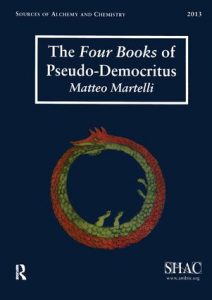Podcast episode
March 4, 2020
Episode 86: Matteo Martelli on the Pseudo-Democritus
 The author known as Democritus wrote four books some time in the first century CE: one book on gold, one on silver, one on gemstones, and one on dying techniques. These became one of the seminal documents of the alchemical tradition. None of them survives in its entirety, but we have extensive fragments, which allow us to see, to some degree, what the Pseudo-Democritus was up to. His works became one of the most important canonical sources for later alchemists, and he became a legendary figure.
The author known as Democritus wrote four books some time in the first century CE: one book on gold, one on silver, one on gemstones, and one on dying techniques. These became one of the seminal documents of the alchemical tradition. None of them survives in its entirety, but we have extensive fragments, which allow us to see, to some degree, what the Pseudo-Democritus was up to. His works became one of the most important canonical sources for later alchemists, and he became a legendary figure.
We discuss how our Democritus became confused with Democritus of Abdera, the famous atomist philosopher of the fifth century BCE. We then look at two other important figures of the very early alchemical tradition, Bolus of Mendes (an Egyptian who lived some time probably in the second century BCE who wrote works on natural sympathies and antipathies and on artificial substances (χειρόκμητα)), and Ostanes, legendary Persian sage and alleged teacher of Democritus, both of whom represent earlier forays into natural science which fed into Democritus’ alchemical work.
Finally, Professor Martelli expands on the alchemical theory found in the Four Books: the concept of Nature is central, but is a multivalent and subtle category with several distinct usages. The four qualities (hot, cold, wet, and dry) are present as basic states of nature, following the Hippocratic and Aristotelean traditions, bringing about sympathies and antipathies in natural substances. We finish with a discussion of the anecdote wherein Democritus’ teacher dies without revealing the final secret of alchemy to him. Democritus then raises his spirit to question him, and learns that the secret has been hidden in an Egyptian temple, though its exact whereabouts remain obscure. Luckily, however, the temple collapses, revealing the message hidden within a pillar:
Nature delights in Nature. Nature overcomes Nature. Nature rules Nature.
Interview Bio:
Matteo Martelli is Associate Professor in the Department of Philosophy and Communication at the oldest university in the world, the University of Bologna. He has published widely on alchemy, specialising in early alchemy in particular, and heads the ERC research-project AlchemEast: Alchemy in the Making: From Ancient Babylonia via Graeco-Roman Egypt into the Byzantine, Syriac and Arabic traditions (1500 BCE -1000 AD).
Works Cited in this Episode:
Primary:
- Democritus’ education at the feet of the Persian sage Ostanes: Syn. Alch. I, ll. 5-17.
- Lucius Annaeus Seneca was a Stoic philosopher who served as tutor to the young emperor Nero. He refers to Democritus’ recipe for making artificial gemstones at Ep. XC 26.
Secondary:
- Festugière on alchemy: La révélation d’Hermès Trismégiste. Les Belles Lettres, Paris, 2014, pp. 233-298.
- Martelli 2013 (see below)
Recommended Reading:
Check out Matteo Martelli’s many fascinating publications on ancient alchemy, some of which can be found on his Academia page. Also check out the ambitious AlchemEast project, of which he is the director, which is putting our understanding of the ‘lost centuries’ of alchemy on a much firmer footing, and keep your eye on the publishing project, Sources of Alchemy and Chemistry, from which we expect great things.
- Joseph Bidez and Franz Cumont. Les mages hellénisés: Zoroastre, Ostanès et Hystaspe d’après la tradition grecque. Les Belles Lettres, Paris, 1938.
- Robert Halleux and Henri-Dominique Saffrey. Les alchimistes Grecs. Les Belles Lettres, Paris, 1981.
- Jackson P. Hershbell. ‘Democritus and the Beginnings of Greek Alchemy’. Ambix, 34: 5–20, 1987.
- Jack Lindsay. The Origins of Alchemy in Graeco-Roman Egypt. Barnes & Noble, New York, 1970.
- Matteo Martelli. ‘“Divine Water” in the Alchemical Writings of Pseudo-Democritus’. Ambix, 56(1):5–22, 2009.
- Idem. ‘Greek Alchemists at Work: ‘Alchemical Laboratory’ in the Greco-Roman Egypt’. Nuncius, 26:271–311, 2011a.
- Idem. Pseudo-Democrito, scritti alchemici con il commentario di Sinesio. S.É.H.A.-Archè, Paris/Milan, 2011b.
- Idem. The Four Books of Pseudo-Democritus. Sources of Alchemy and Chemistry: Sir Robert Mond Studies in the History of Early Chemistry Volume 1. Maney Publishing, Leeds, 2013.
- F.S. Taylor. ‘A Survey of Greek Alchemy’. Journal of Hellenic Studies, 50:109–139, 1930.


Amy Tibbetts
June 3, 2020
LOL, I wanted to hear about the dying techniques–then figured out it’s dyeing, as in purple dyes! LOL. You can never tell with alchemists.
(At least he could raise the ghost of his dead master…)